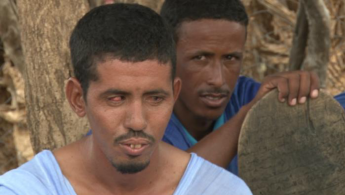Mauritania: Blind villagers deserted by government
The village is located deep within the Sahara Desert, 60 km from Timbedra, a town in southeast Mauritania.
"The blindness has made our difficult desert lives even harder," says 60-year-old Salem Ould Mohammad, as he complains about the government's failure to help villagers.
An increasing number of children are being born with congenital defects, he said, which is damaging the prospects of the village of 2,000.
Saadna Ould al-Shiekh, who is also blind and lives in Dali Gimba, has given up hope of receiving medical care from either the government, or any non-governmental organisation.
| Locals hope the government will send a team of eye specialists to the village to restore the eyesight of those affected. |
In the past, villagers have had their sight restored by modern medicine. Locals hoped the government would send a team of eye specialists to the village to restore the eyesight of those affected.
Villager Mohammad Lamine is shocked by government's failure to help. "It is as if we are not citizens. The people in charge have shown no interest in the people they are responsible for."
Ould Mohammed explains that, because of their blindness, many villagers never leave the village. Therefore, as the incidence of blindness increases, the village is likely to become increasingly isolated from wider society.
Most of the blind villagers survive by begging. However, some old men can tell the difference between salt and fresh water by smelling the land above the water reserves, and are employed by neighbouring villages to find suitable locations to dig wells.
Villagers settle disputes through local councils and vote in the legislative council elections. They have asked for better health facilities, schools, and social welfare. Their demands, however, have been ignored at the national level.
Discussing children's education, village elder Mohammad al-Mukhtar says village children learn to memorise the Quran, but the government has ignored elders' demands and failed to provide a school.
Ould Mohammad told al-Araby al-Jadeed they were tired of "false promises" during election campaigns. "As soon as they are elected we hear nothing more," he said.
He hopes the government will change its policies and fulfil villagers' dreams - by providing clean drinking water, a school and a health clinic.
This article is an edited translation from our Arabic edition.



